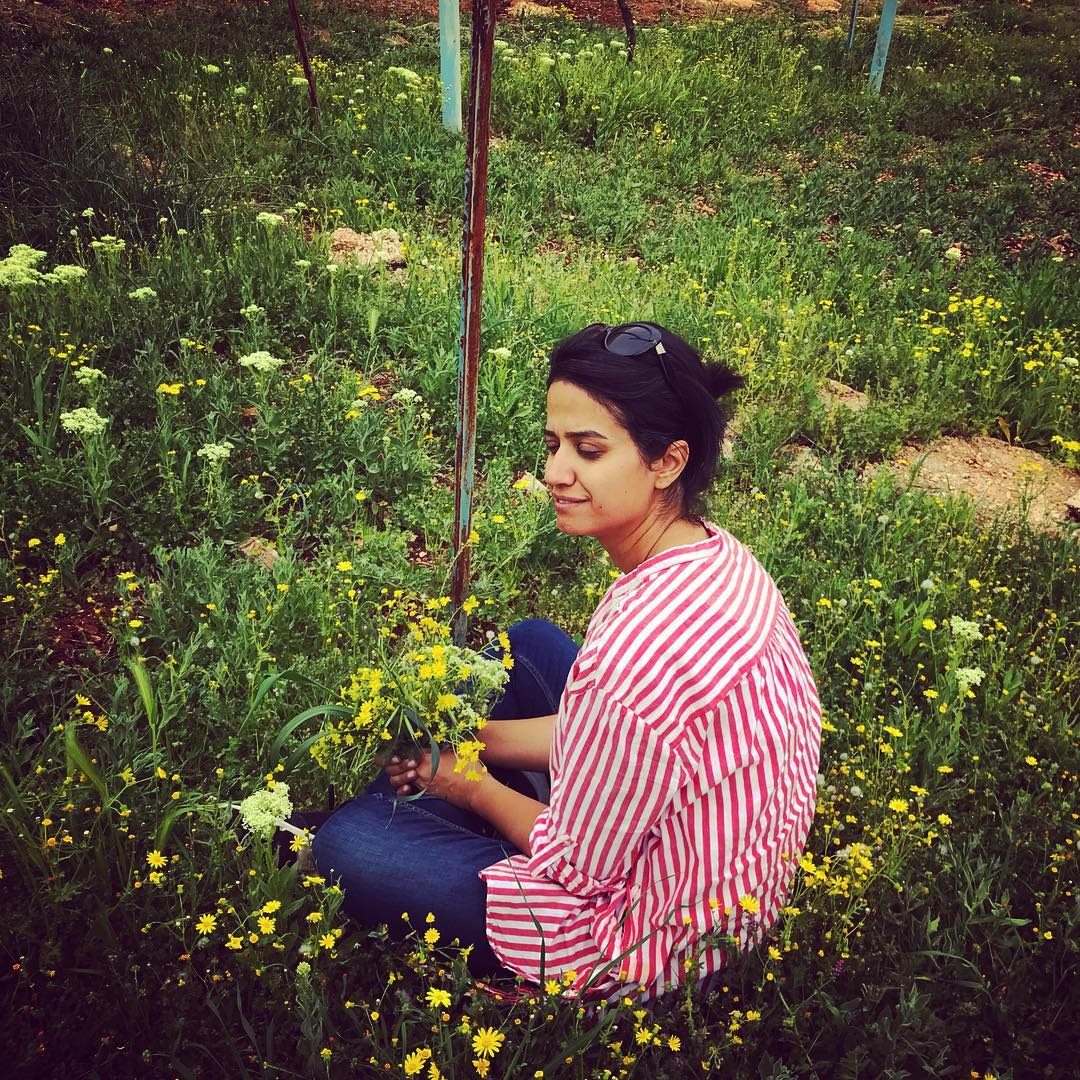Have you tried to make your life and the lives of children around you a "story"?!
Samya reads... Samya did it
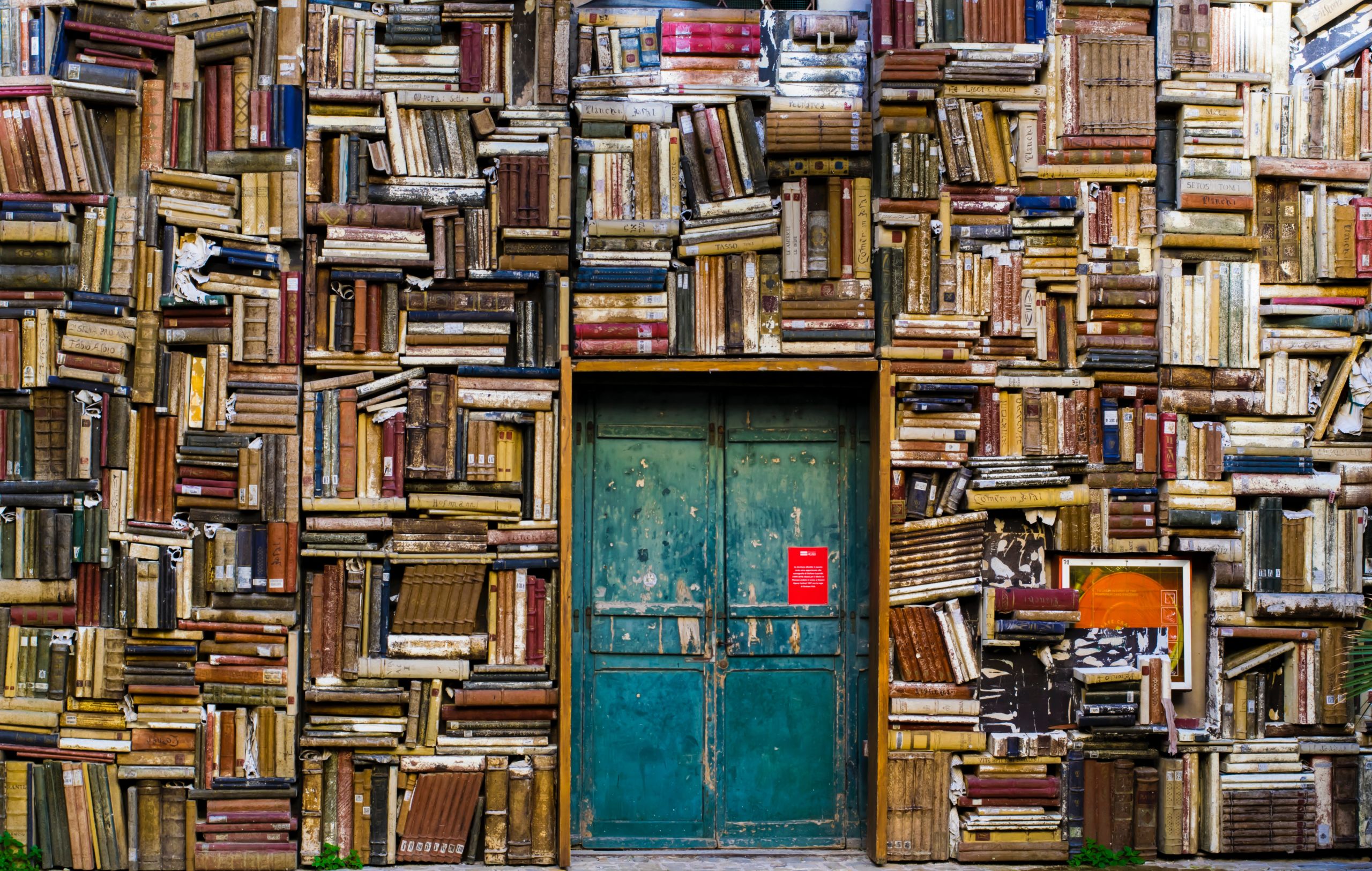
A breeze blew turning the book page then came out a beautiful modest little girl. The smile never leaves her face. That girl grew up but she has never forgot that book with its different stories that taught her how to dream.
The older she gets, the more she is attached to that little girl within who loves stories and admires telling them in every workshop with young children, during which she enumerates beautiful details of those books to them.
A mother of two wonderful boys, Samya Ayish is a journalist and a storyteller. She believes that "every part of our life has a story and we must have the tools to tell these stories".
Join us on this inspiring journey to explore Ayish's story!
Children who love stories
The magical secret recipe is not only in the book!
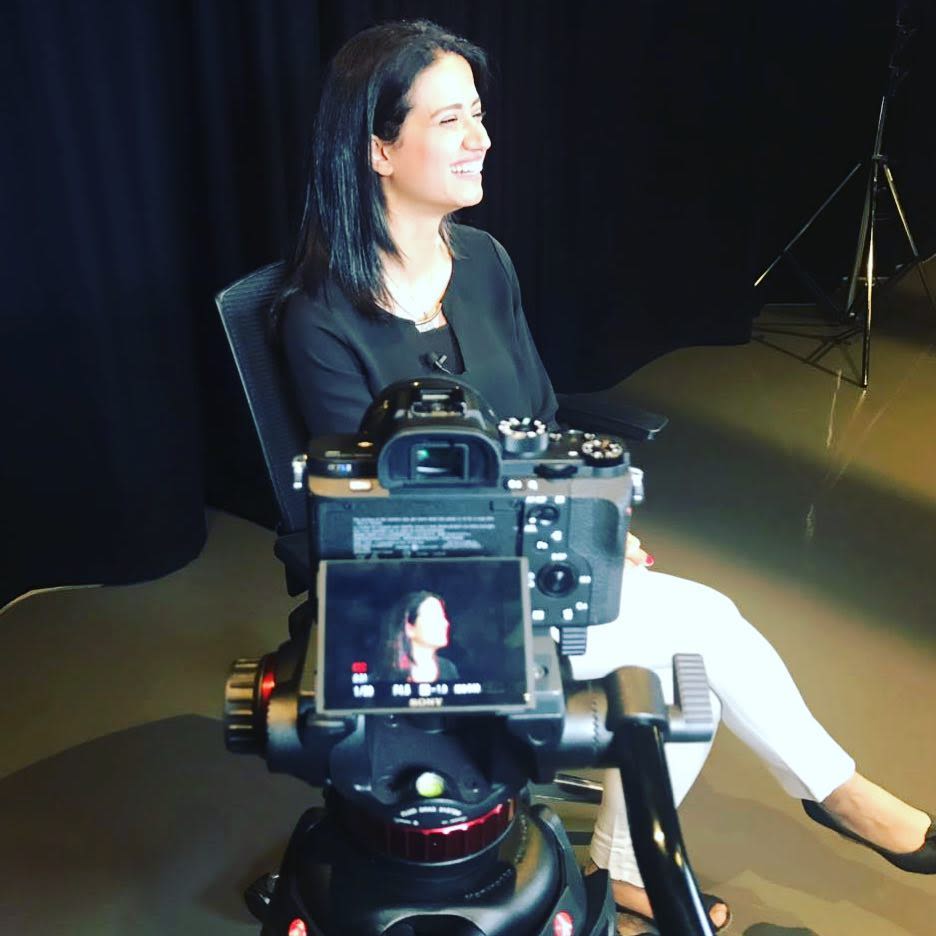
Years ago, on one scorching Dubai night, two big bubbles burst from the window of one of the flats, each with a young child inside it, Youssef and Ghazi. Each bubble soared in a separate direction, a journey that normally lasts no longer than the time the little eyes are able to stay awake.
Their day is only complete when she or they tell a story, regardless of who tells it – whether she or they and whether the story comes from a book, her imagination, or even their imagination.
But what is certain is that these beautiful eyes will not fall asleep until a joyful trip with new characters takes place every night.
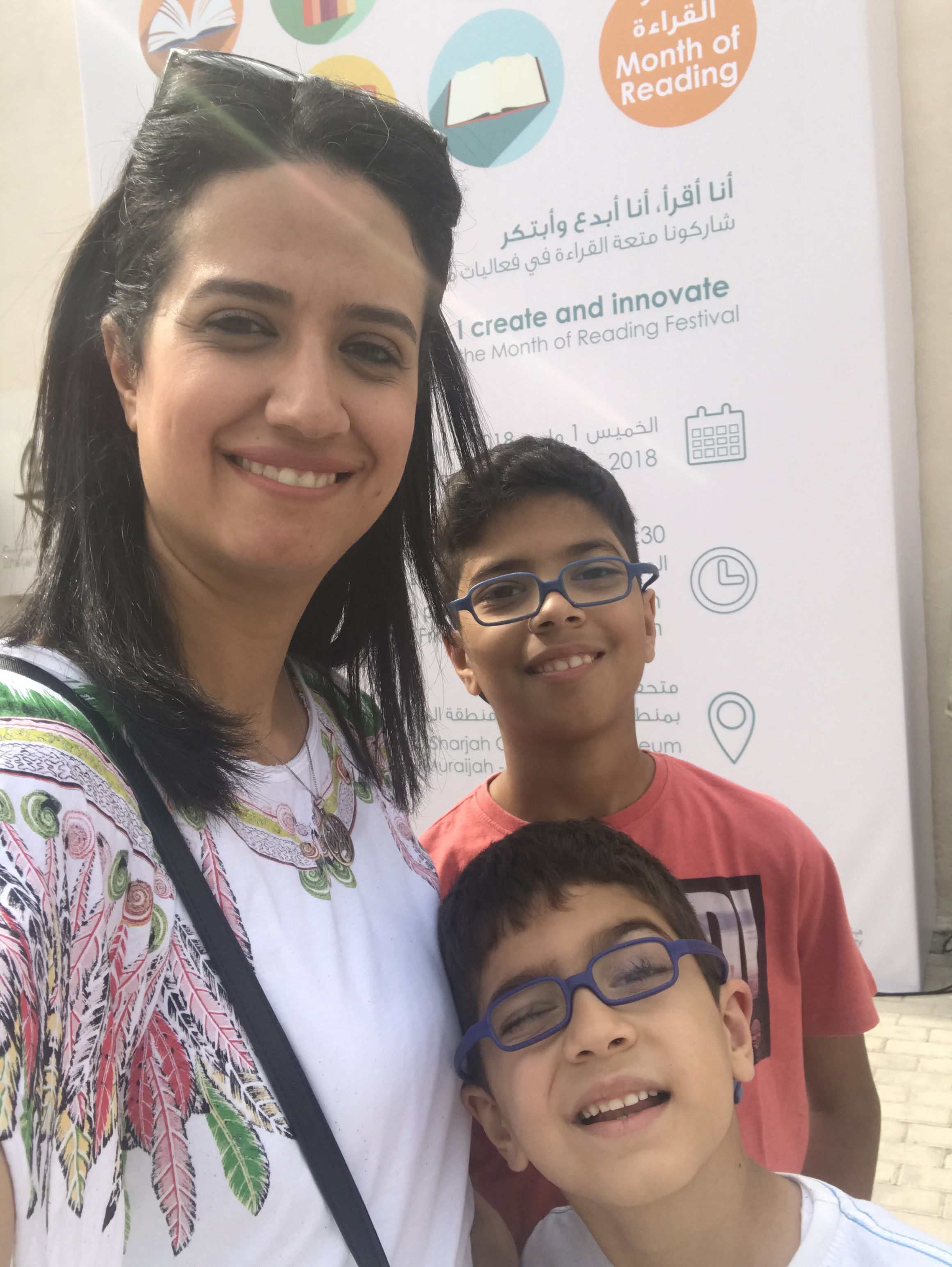
Samya with her Kids
Samya with her Kids
What makes Samya's work stand out is that it is not restricted to her children. Since 2010, Samya has held workshops for children to help them create a clear and unique relationship with books, as well as provide them with inspiration, motivation, and resources to tell their own tales and express themselves in their own unique way.
"For almost 15 years, I have been writing for the press and covering many events and activities in the Middle East. Beyond work hours, I was engaged in the world of children's books, reading, writing, sketching, moving, visualising their sounds, and living in a new childlike world".Samya said
This mix made by the Palestinian journalist in her workshops created a relationship between the child and the book, based on a unique style of storytelling in which she notices "a skill that we must acquire for future generations, as it helps them engage, communicate with each other, and express their opinions".
"One day, our children will grow up and talk about their concerns and issues. We want them to be strong and clear headed when dealing with everything around them so they won't lose their self-confidence," Samya added.
One of these children accompanied Samya in her first writing experience in the children's world, in a story entitled "Big, Small".
About her story "Big, small"
"The little boy, the story's narrator, explains to us that, while he is young and relies on adults for many things, he is also capable of performing many activities without their support, and assures us that as he grows up, he will be able to do everything on his own."
The story is about an experience children of various ages go through and supports their trust in their own skills. It also teaches them that seeking help at a young age is normal, and that the aspiration for independence is appreciated and necessary."
The age segment targeted by this book is 3 to 6 years.
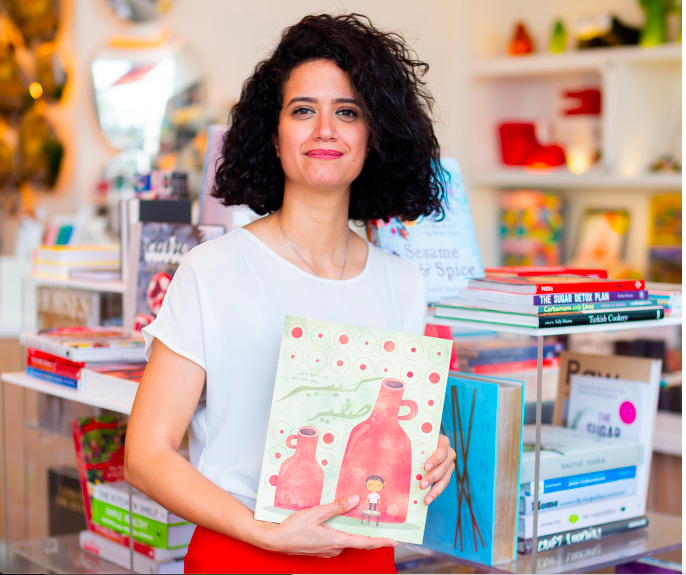
"What you cannot find, make it!' This quote was behind Samya's authorship of her first book in the world of children's literature. She said: "When my children were younger, I felt the need for a book that echoes our pressing needs. Eventually, if each of us does something similar to what I did, the result would be magnificent and we would find ourselves having distinctive content with a touch of personal privacy."
This matter caught the attention of Samya in one of the workshops about her book "Big, Little". While she was in a storytelling workshop with children about her book, she heard a child repeating words with her and even preceded her by the story of her events.
After the session, Samya went looking for this little girl and learned that the latter was a big fan of this book, wanting her mother to read it to her every night at bedtime.
"The girl memorized the story and was strongly impressed by its events. What was even more noticeable was that she seemed to have identified herself with a character in the story," Samya added.
"In short, what you can't find, make it!" Samya told Tiny Hand. "This piece of advice is applicable to nearly every aspect of our lives in this house, as well as the way we resolve our problems and come up with creative solutions."
"Big, Small" was Samya's start in a wonderful journey in the world of children's literature, and her attempts to think out of the box while writing books are inspiring. She is currently in the process of releasing a collection of stories about "untalked-of" professions, as she described them. Such professions rarely receive children's attention as do other more common professions (such as physician and engineer). Samya is trying to bring children closer to different professions by building role models for them in each of those fields, such as journalism, singing, etc.
Now, how do you choose the right book for your child?
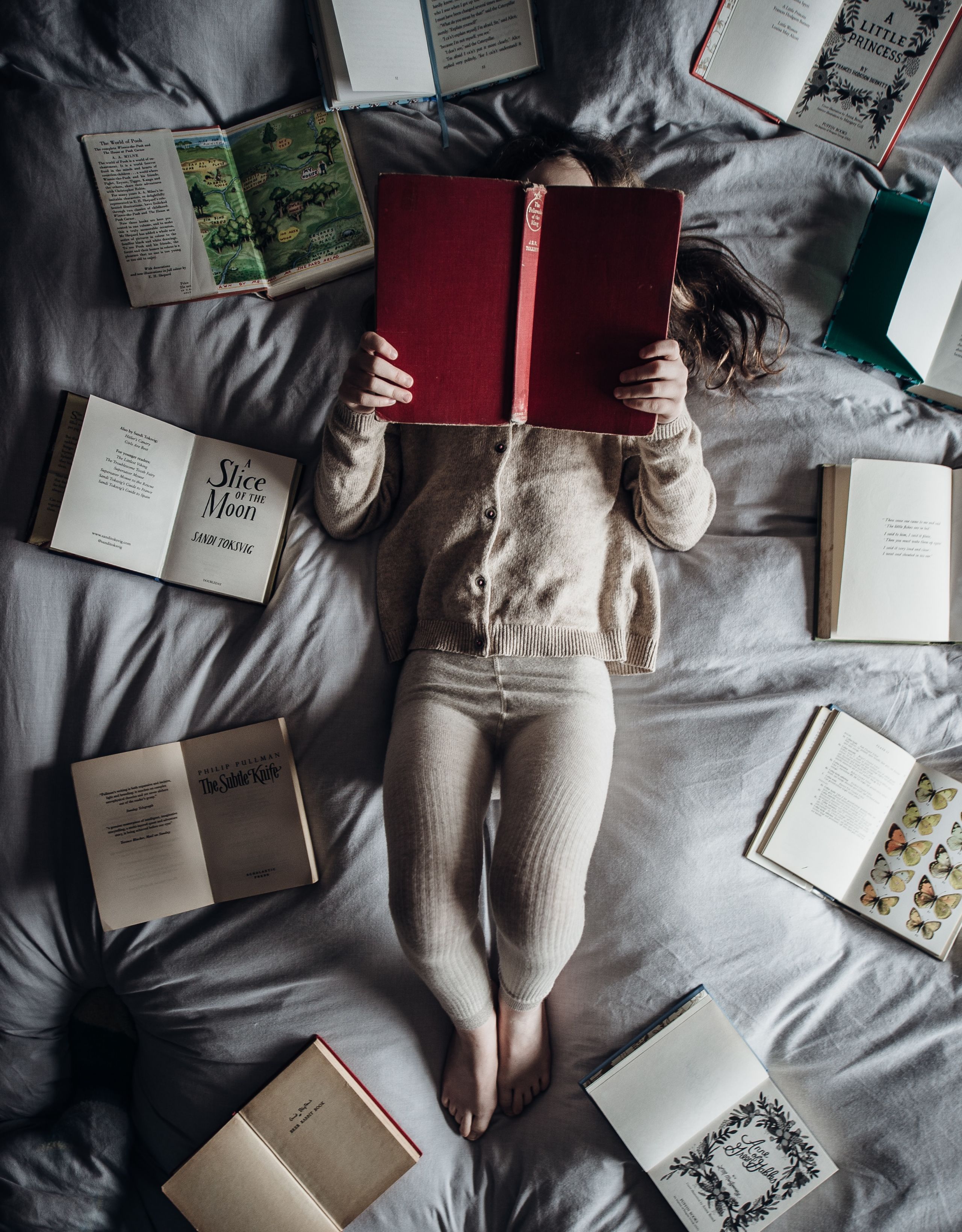
If you want your child to be a reader, first you need to grab a book and read it!
This was Samya's first piece of advice when we asked her what initiatives parents may take part in with their children to help them develop a passion for reading.
"When a youngster sees you holding a book and enjoying reading it, s/he will want to do the same, and reading will become a part of her/his daily routine," she explained.
On the other hand, "the concept here is not about what kind of book you will choose for your child; there is no one rule for that," Samya explained. "If s/he loves English, bring her/him an English novel; if s/he likes science, bring a scientific book."
A book should become a source of pleasure for the child and not only be related to school and education. There are simple steps we can do at home, according to Samya, for example, placing books in children's toy boxes especially those made of fabric and cardboard.
"It shouldn't merely be put on a wooden shelf out of reach of a youngster," Samya added. Since she was a kid, she used to have stories and books as part of her toys. This is something she passed on later passed to her children.
To figure out what book is suitable for your child, talk to them, understand their inclinations and talents, and listen to and discuss their opinions with them.
"Hence, everything starts from home and the way we deal with our children," affirmed Samya.
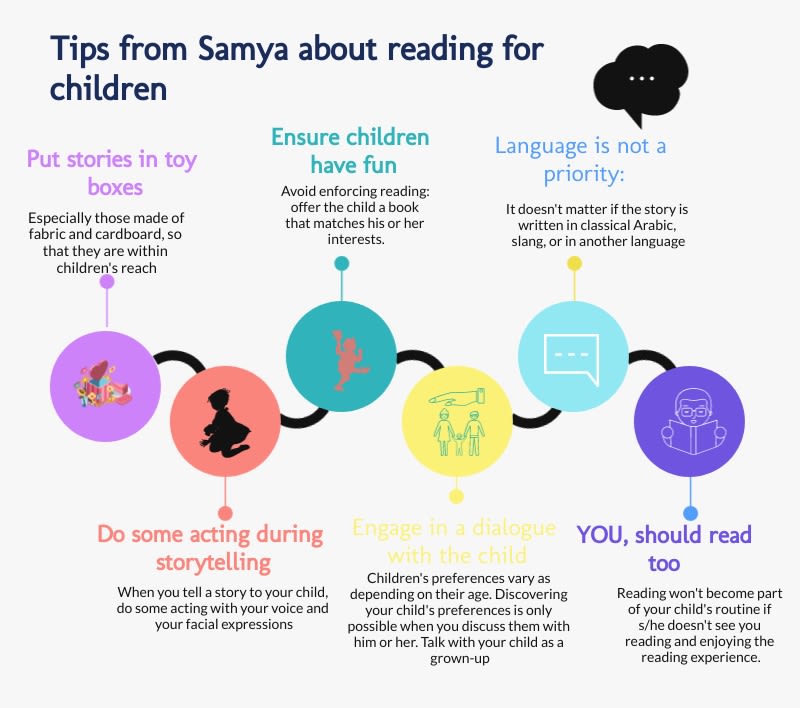
"Dialogue is missing in our families in the Arab world and refrain from removing age boundaries between us. Adults should speak up their opinions and give children the chance to express their thoughts freely"
Imagination is more important than knowledge
There's a famous saying of Albert Einstein's that goes like this: "imagination is more important than knowledge. For knowledge is limited to all we now know and understand, while imagination embraces the entire world.” Samya considers imagination a crucial part of our existence. She said: "We can't survive without imagination." Imagination is an integral part of the world of stories.
If you are someone who reads stories almost daily to your children, you will find yourself for a moment possessing no book to turn its pages and narrate its stories. All you have to do then is to follow Samya's lead and play the game of imagination with her children, inventing stories based on her own and her children's imaginations.
You're now invited to know more about her imagination. Samya says:
"Once upon a time, there were two beautiful children named Yusuf and Ghazi playing in front of their house. Suddenly, they blew a balloon of soapy water and a big bubble formed around them. Go ahead boys, fly high in the sky and speak about what you could see!"
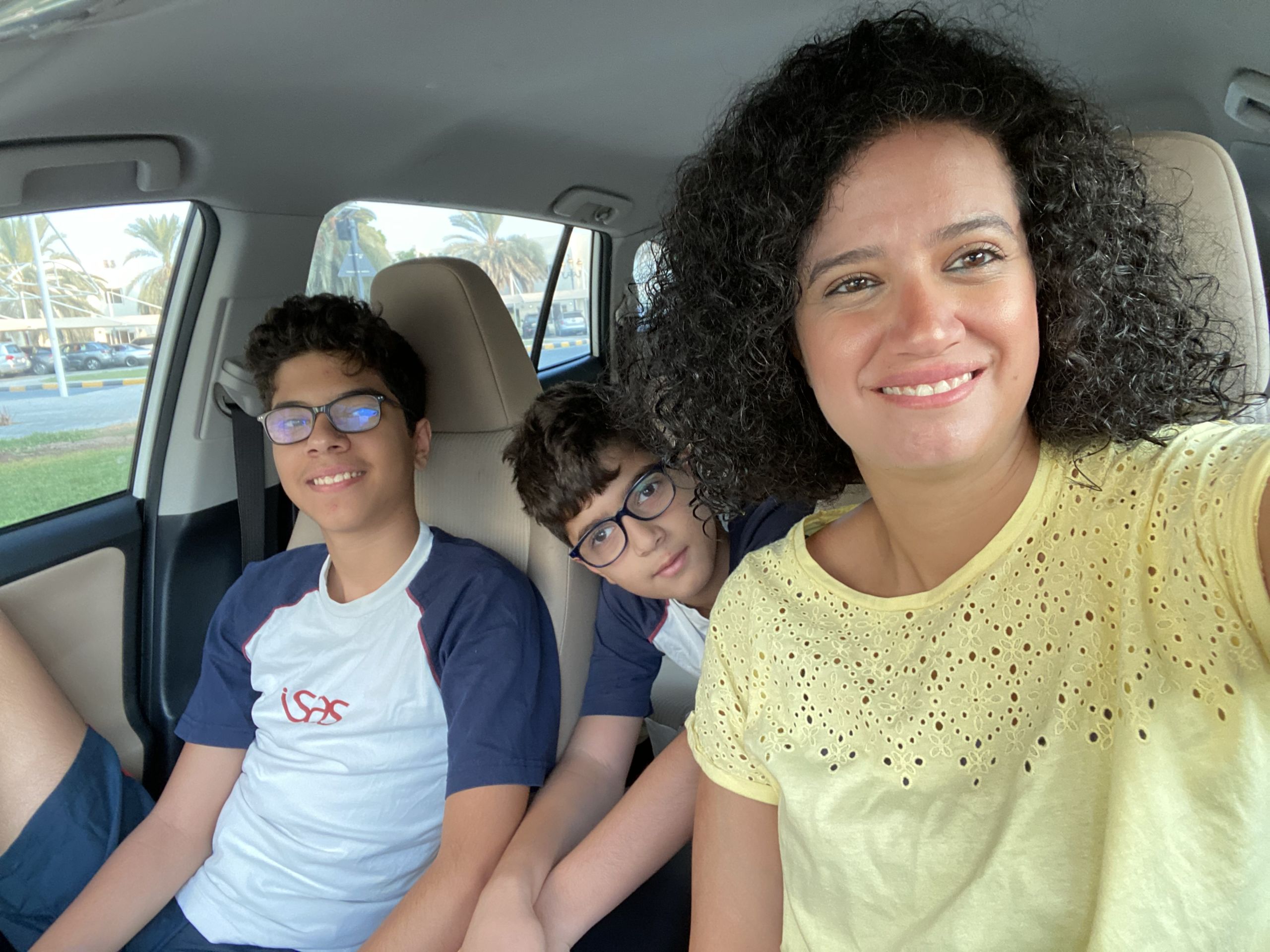
spontaneous opinions. "They need somebody who will listen to them without making judgements or imposing an opinion on them," Samya explained.
The child's startling innocence is what motivates Samya to continue holding workshops, especially as she finds herself addressing a spontaneous audience that does not use sophisticated words to express their opinion, delight, or even rage.
"I am sure that these children, after completing the workshop and introducing the details of the tale by jumping and sleeping on the floor, screaming and crying, they sincerely express their feelings when applauding joyfully for me."
Q: Which books are better, those written in classical Arabic or in the colloquial dialect?
A: "When it comes to literature and stories, I prefer not to stick to one variety only, because each has its own unique characteristics."
"The details of the story are conveyed in a different way in colloquial dialect, evoking the golden era of storytellers and grandparents' stories, and so on. Classical Arabic is characterized by its musical tone, especially when the story is narrated in a musical way that attracts the child. It has different levels of simplicity and complexity."
"At the end of the day, we should think of language as a means of communication. Use the language you are comfortable with and the one that helps you communicate your ideas."
Home Comes First
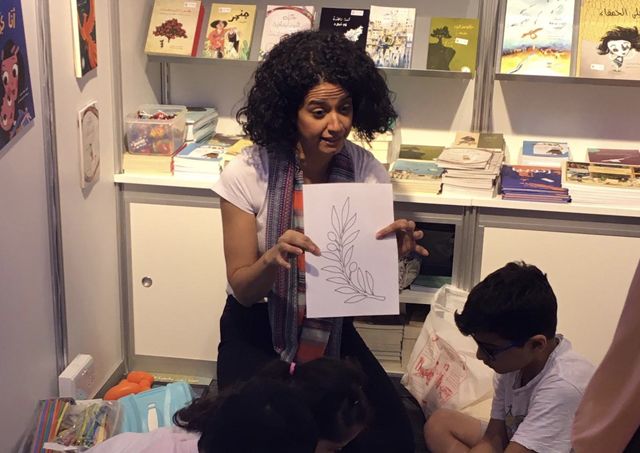
Samya, a journalist who finds herself during the day immersed in the details of the events that are going on in our Arab region, is at the end of the day a mother of two children who grew up in front of her eyes and at the same time a storyteller who has a strong relationship with the world of children. This storytelling world made her promise herself that she’ll never stop holding such workshops regardless of her workload.
Samya comes from a well-educated family that had a significant part in raising a modest, hardworking girl. She has not been afraid to express herself and take part in a variety of events. She understands that the gift she was given by her parents should go beyond serving merely herself or her two sons.
Engaging with a dialogue with a child, whether at home or school, is uncommon in the Arab world. "When an older member of the family speaks, the younger one must remain silent as an act of subordination or parental dominance," Samya said.
She advised that we should all strive to break that subordination as we raise children. For example, she and her child who is a big fan of football, talk about this sport, watch matches together, narrate sports-related stories, and feel no boredom when he keeps talking about football players and their news.
At the closure of our interesting interview with Samya, she said: "Parent-child communication is the basis of everything, and it starts at home."
"A child is a child wherever s/he lives, either in a camp or in a house. The joy a book creates is common amongst all children. Only children are innocent enough and hope that tomorrow is a better and more beautiful day," Samya
